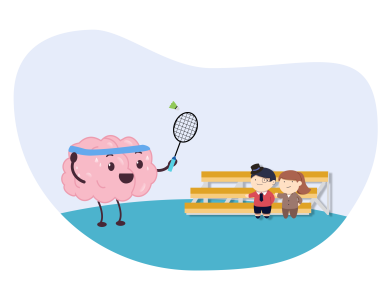Today, we’ll learn about emotional intelligence and its five components! In this article, we’ll go over some of the steps you can take to develop your EQ. You can improve your emotional quotient (EQ) by focusing on and developing these abilities.
Emotional intelligence skills include awareness of and control over one’s own emotions as well as those of others. Success in school, making good choices in life, and other areas are all tied to developing these skills. Some people say that emotional intelligence (EQ) is just as important as intelligence (IQ).
In what ways does one need to develop emotional intelligence? Daniel Goleman, a psychologist who popularized and extensively wrote about the concept of emotional intelligence, outlines five components of intelligence in this area.
5 Components of Emotional Intelligence
1. Self-Awareness
The ability to know and understand one’s own feelings is a key component of emotional intelligence. Being self-aware is the first step in dealing with negative emotions, but awareness of how your moods, actions, and words affect others is equally important.
If you want to develop your sense of self-awareness, you need to train yourself to keep tabs on your feelings, spot when you’re having a variety of different emotional responses, and then put a name to each one. People who are in touch with their inner selves recognize the connections between their emotions and actions.
People who have this trait are also self-aware, curious, and teachable through their interactions with others and the world as a whole. Self-aware people, according to Goleman, have a sense of humor, believe in themselves and their abilities, and can gauge others’ opinions of them accurately.
Ways to Improve Self-Awareness
- Inquire about how you can improve.
- Record your thoughts and experiences in a diary.
- Acquire new and more effective skills and knowledge.
- Meditate
- Follow your heart and do what you love.
- Include mindfulness in your daily life.
- Consider your past actions and their impact on you.
- Think and speak positively to yourself.
- Do your best to foster a growth mindset.
- Pay close attention to how you feel and what you’re thinking.
- Set Goals
2. Self-Regulation
Emotional intelligence involves more than just being in tune with your feelings and aware of their effects on those around you; it also necessitates the capacity to control and channel those feelings in productive ways.
Waiting for the appropriate moment to express one’s feelings does not imply putting them on lockdown. Communicating how you feel in a healthy way is core to self-regulation.
People who are good at controlling their emotions are also good at handling change. They can calmly and effectively defuse potentially explosive situations.
Highly conscientious people are also likely to have excellent self-regulation skills.
They are self-aware and aware of the impact they have on others.
Ways to Improve Self-Regulation
- Pay attention to how you feel and what you think.
- Enhance your ability to deal with stress.
- Learn to cope with your overwhelming feelings.
- Approach difficulties as potential growth opportunities.
- Develop your ability to express yourself.
- Consider that your reaction is not predetermined.
- Alter your way of thinking and how you feel by employing metacognitive strategies.
- Develop the habit of allowing yourself to feel whatever you feel.
3. Social Skills
Emotional intelligence also includes the ability to communicate effectively with others.
One’s ability to connect with others and gain insight into oneself and the world around you greatly improves with practiced social interaction skills.
A complete understanding of emotions requires knowledge of not only one’s own but also one’s fellow humans’ emotional states. You must also be able to use this knowledge in your regular conversations and exchanges with others.
Managers gain the most when they are able to connect with their staff and establish trusting working relationships with them. Building trusting relationships with superiors and peers benefits employees. Active listening, the ability to express oneself clearly and effectively in writing, and the ability to lead and persuade others—these are all essential social skills.
Ways to Improve Social Skills
- Focus your attention on the people around you.
- Maintain friendly and open eye contact.
- Put in some social practice.
- Engage in attentive listening. Show genuine curiosity about other people.
- Mind your body language.
- Discover conversation-starting icebreakers.
- Ask open-ended questions.
4. Empathy
The ability to empathize with others, or to feel what they are feeling, is fundamental to developing an emotional quotient. To do this, however, takes more than a simple awareness of people’s feelings.
This also includes how you react to people based on what you learn about them. What do you do when you notice a friend or loved one is feeling down and discouraged? You could try to make them feel better by treating them with extra kindness and compassion.
When you have empathy, you can better comprehend the power dynamics that shape many interpersonal relationships, especially in the workplace. This will help you navigate the wide range of people you come into contact with on a daily basis.
Those who excel in this area can quickly assess who holds the upper hand in any given set of relationships. They are also aware of the ways in which these factors affect emotions and actions. This allows them to correctly assess situations where such power dynamics are at play.
Ways to Foster Empathy
- Communicate your emotions openly.
- Participate in an activity, such as a community service project, that you believe in.
- Pay attention to what other people have to say.
- Meet new people.
- Put yourself in the shoes of someone else.
- Try some meditation on love and kindness.
5. Motivation
The ability to be motivated by internal factors is another key component of emotional intelligence. Motives other than money, fame, and praise are what drive emotionally intelligent people.
Instead, they are driven by a strong desire to satisfy their own internal requirements. They look for inward satisfaction, the “flow” that comes from being in the “zone,” and they chase after peak experiences.
Competent people in this field are typically doers. They take initiative, have a strong drive for success, and are constantly trying to improve. They have a strong sense of commitment and often take the initiative to do things on their own.
Ways to Improve Motivation
- Do not rely too heavily on bribery and other forms of external motivation.
- Recognize your accomplishments.
- Set short-term, easily-attainable objectives.
- Throw in some obstacles to keep things exciting.
- Achieving one’s goals is a great way to boost one’s own intrinsic
- Find an accountability partner, whether it’s a friend, coworker,
Reasons to Improve Your Emotional Intelligence
There are numerous ways in which a person’s life can benefit from the development of their emotional intelligence. Those who possess such abilities never lose their composure. Even in uncomfortable social situations, they are able to maintain their composure. And they have an unusual ability to put people at ease.
Possessing high levels of emotional intelligence has many positive outcomes:
Leadership: Having high emotional intelligence will make you a more powerful leader.
Communication: Understanding the emotions of those around you will help you communicate with them more effectively.
Self-regulation: Developing your capacity for self-regulation is a natural result of cultivating emotional awareness.
Self-control: Controlling your emotions gives you more power in high-stakes, high-tension situations.
Stress Management: Having better emotional control makes you more effective when dealing with stressful or conflicting situations.
In Conclusion
Having a high level of emotional intelligence also boosts your capacity for empathy. Having this ability is crucial for making and keeping friends and acquaintances. Maintaining supportive relationships with others is essential to one’s mental and physical health.
Understanding yourself and navigating your social world with ease requires a high level of emotional intelligence. Even though it may seem like some people are naturally good at this, everyone can improve their emotional intelligence in a number of ways.







